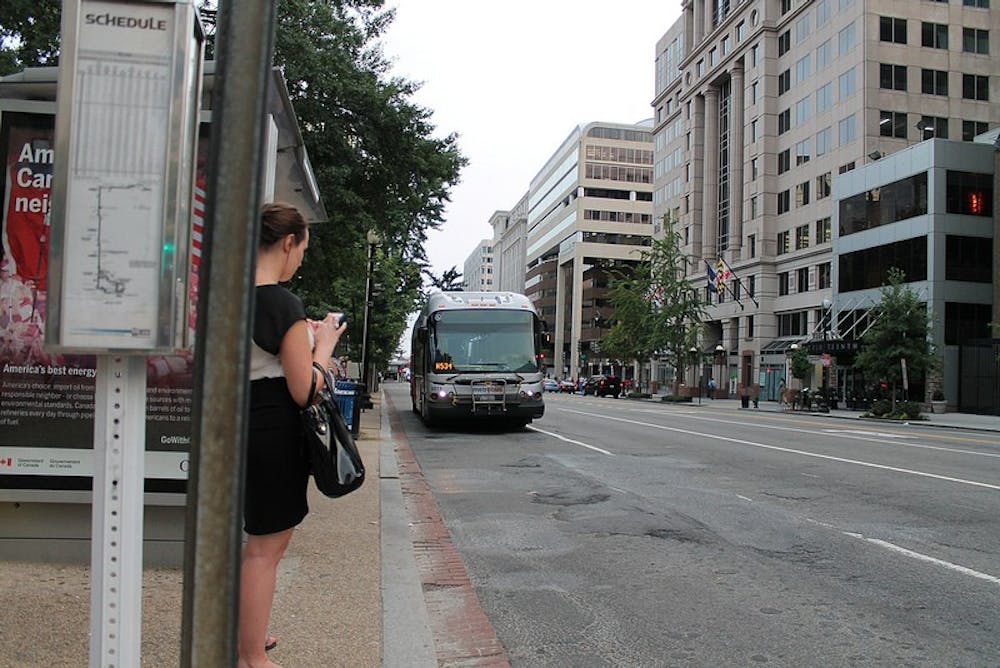AU hosted a town hall on Monday night to discuss the proposed AU student Metro pass program, and the event was led by AU Executive Director of Risk, Safety and Transportation Daniel Nichols, Washington Metropolitan Area Transit Authority directors Tracey Foster and Jawauna Greene, AU student and Deputy Director of Public Communications Kris Schneider and Metro Transit Police Deputy Chief Kevin Gaddis.
The program, titled UPass, would allow AU undergraduate and graduate students to have unlimited Metrorail and Metrobus rides for $130 per semester. Students can vote for this referendum through their myAU portal until Friday, March 4. If this proposal passes, the program will move on to AU administration for approval.
Tracey Foster, director of customer service, sales and fare media with the WMATA, said that the program aims to promote public transit, evaluate student response and program acclimation, increase regional access and measure ridership into greenhouse gas equivalency in addition to reducing costs for students.
“What are we hoping to accomplish?” Foster asked the town hall before responding with her reasons for the implementation of the pilot program.
“One is to reduce student transportation cost and that’s probably the largest goal that we have, ” Foster said during the town hall.
Foster explained that UPass is already in use at over 200 colleges across the United States and Canada in cities such Atlanta, Chicago, Philadelphia and Los Angeles. If implemented at AU, students will receive a customized AU metro pass and would be the first D.C. college or university to have this program.
To illustrate the increased value UPass could create for students, Foster said that currently, a student could pay $2.15 to $5.90 for one trip on Metrorail and $1.75 on Metrobus. The Metrobus system currently uses a flat rate, while the Metrorail’s charges differ depending on the length of the ride.
If UPass is implemented at AU, students will not be able to opt out of the program.
“We make the statement that says the ‘Average AU student could save up to $1,000 each year.’ What are we basing that on? We’re basing this on actual fare structure,” Foster said.
Some students shared during the town hall how much they are currently paying for their fairs for work or internships.
“I spend about $20 a week to commute to my internship,” one of the students at the forum said.
Foster also said that the UPass program would benefit the environment by preventing 400,000 tons of carbon dioxide equivalent and 260 volatile organic compounds from being released into the environment that cars bring into the environment. Additionally, $9.5 million would be saved in costs due to these emissions because more students would be taking Metrobus or Metrorail, instead of driving or taking a taxi, Uber or Lyft ride according to Foster. All of this information can be found on WMATA’s sustainability report for 2015.
Jawauna Greene, director of advertising and marketing for WMATA, discussed why AU was chosen as the first school to participate in the District.
“Beyond the aesthetics of ‘hey, I’m only riding for $1’ this really represents the transformation of thought, and we think we chose the right place to do this because this school is known for having the greatest thinkers,’ Greene said.
To encourage the program, Police Deputy Chief Kevin Gaddis discussed the safety measures in place for Metrorail and Metrobus users, as there have been high profile crime cases in Metrorail and Metrobus. According to Gaddis, WMATA has 450 police officers staffed that patrol the Metrorail and Metrobus, in uniform and casual clothes.
“Our crime rate is relatively low. Two years ago, 2014, we had a 27 percent decrease in our part I crimes from the previous year which is really unheard of,” Deputy Chief Gaddis said.
Part I crimes are crimes that involve murder and nonnegligent manslaughter.
The town hall and student voting process marked the official start of the project, according to Foster, and WMATA will begin further campus outreach and marketing following the referendum. Then WMATA will begin testing the program from April to June of 2016. And from July to August of 2016, training student registration, marketing and the UPass program launch will begin.
Lisa Boms, the assistant to the vice president of Campus Life, ended the town hall reflecting on why University administration is in support of this partnership.
“We hear about a lot of students facing barriers not only about [learning how to use] the Metro but also [being able to] socialize and being kind of like on the same page as your peers [by being able to afford to use the Metro]. We feel like this kind of levels the playing field, everyone has the same access to activities, opportunities to socialize and as well as internships and all of those things,” Boms said.
news@theeagleonline.com





